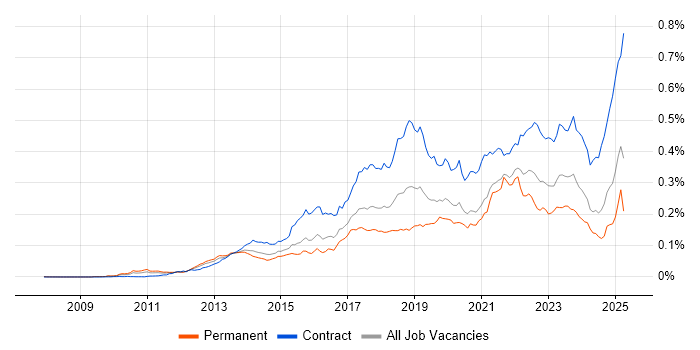Workday
UK
The table below provides summary statistics for permanent job vacancies requiring knowledge or experience of Workday products and/or services. It includes a benchmarking guide to the annual salaries offered in vacancies that cited Workday over the 6 months leading up to 1 May 2025, comparing them to the same period in the previous two years.
The figures below represent the IT labour market in general and are not representative of salaries within Workday, Inc.
| 6 months to 1 May 2025 |
Same period 2024 | Same period 2023 | |
|---|---|---|---|
| Rank | 583 | 723 | 804 |
| Rank change year-on-year | +140 | +81 | +19 |
| Permanent jobs citing Workday | 109 | 173 | 185 |
| As % of all permanent jobs advertised in the UK | 0.21% | 0.18% | 0.18% |
| As % of the Vendors category | 0.57% | 0.47% | 0.43% |
| Number of salaries quoted | 54 | 116 | 106 |
| 10th Percentile | £50,900 | £43,500 | £40,000 |
| 25th Percentile | £56,250 | £68,813 | £51,750 |
| Median annual salary (50th Percentile) | £70,000 | £75,000 | £70,000 |
| Median % change year-on-year | -6.67% | +7.14% | +5.66% |
| 75th Percentile | £85,000 | £81,563 | £90,000 |
| 90th Percentile | £97,500 | £95,000 | £100,000 |
| UK excluding London median annual salary | £65,000 | £73,750 | £57,500 |
| % change year-on-year | -11.86% | +28.26% | -6.12% |
All Vendors
UK
Workday falls under the Vendor Products and Services category. For comparison with the information above, the following table provides summary statistics for all permanent job vacancies requiring knowledge or experience of all vendor products and services.
| Permanent vacancies with a requirement for knowledge or experience of vendor products and services | 19,209 | 36,496 | 43,265 |
| As % of all permanent jobs advertised in the UK | 36.91% | 37.06% | 41.63% |
| Number of salaries quoted | 11,748 | 25,167 | 24,673 |
| 10th Percentile | £27,000 | £26,750 | £31,000 |
| 25th Percentile | £37,574 | £36,000 | £41,250 |
| Median annual salary (50th Percentile) | £55,000 | £50,000 | £57,500 |
| Median % change year-on-year | +10.00% | -13.04% | +4.55% |
| 75th Percentile | £70,834 | £68,750 | £76,250 |
| 90th Percentile | £90,000 | £87,500 | £92,500 |
| UK excluding London median annual salary | £50,000 | £45,000 | £50,000 |
| % change year-on-year | +11.11% | -10.00% | +5.26% |
Workday
Job Vacancy Trend
Job postings citing Workday as a proportion of all IT jobs advertised.

Workday
Salary Trend
3-month moving average salary quoted in jobs citing Workday.
Workday
Salary Histogram
Salary distribution for jobs citing Workday over the 6 months to 1 May 2025.
Workday
Top 12 Job Locations
The table below looks at the demand and provides a guide to the median salaries quoted in IT jobs citing Workday within the UK over the 6 months to 1 May 2025. The 'Rank Change' column provides an indication of the change in demand within each location based on the same 6 month period last year.
| Location | Rank Change on Same Period Last Year |
Matching Permanent IT Job Ads |
Median Salary Past 6 Months |
Median Salary % Change on Same Period Last Year |
Live Jobs |
|---|---|---|---|---|---|
| England | +111 | 98 | £67,500 | -10.00% | 149 |
| UK excluding London | +198 | 52 | £65,000 | -11.86% | 74 |
| London | +83 | 50 | £72,500 | -3.33% | 97 |
| South East | +138 | 35 | £57,500 | -4.17% | 39 |
| Work from Home | +164 | 20 | £63,750 | -15.00% | 69 |
| North of England | +73 | 8 | £75,000 | -0.66% | 13 |
| North West | +28 | 7 | £70,000 | -23.29% | 10 |
| Scotland | +133 | 6 | £75,000 | -6.25% | 6 |
| East of England | +48 | 2 | £52,000 | -30.67% | 2 |
| Yorkshire | +71 | 1 | £90,000 | +5.80% | 3 |
| Midlands | +64 | 1 | £57,500 | -20.69% | 7 |
| West Midlands | +33 | 1 | £57,500 | -20.69% | 7 |
Workday
Co-occurring Skills and Capabilities by Category
The follow tables expand on the table above by listing co-occurrences grouped by category. The same employment type, locality and period is covered with up to 20 co-occurrences shown in each of the following categories:
|
|
||||||||||||||||||||||||||||||||||||||||||||||||||||||||||||||||||||||||||||||||||||||||||||||||||||||
|
|
||||||||||||||||||||||||||||||||||||||||||||||||||||||||||||||||||||||||||||||||||||||||||||||||||||||
|
|
||||||||||||||||||||||||||||||||||||||||||||||||||||||||||||||||||||||||||||||||||||||||||||||||||||||
|
|
||||||||||||||||||||||||||||||||||||||||||||||||||||||||||||||||||||||||||||||||||||||||||||||||||||||
|
|
||||||||||||||||||||||||||||||||||||||||||||||||||||||||||||||||||||||||||||||||||||||||||||||||||||||
|
|
||||||||||||||||||||||||||||||||||||||||||||||||||||||||||||||||||||||||||||||||||||||||||||||||||||||
|
|
||||||||||||||||||||||||||||||||||||||||||||||||||||||||||||||||||||||||||||||||||||||||||||||||||||||
|
|
||||||||||||||||||||||||||||||||||||||||||||||||||||||||||||||||||||||||||||||||||||||||||||||||||||||
